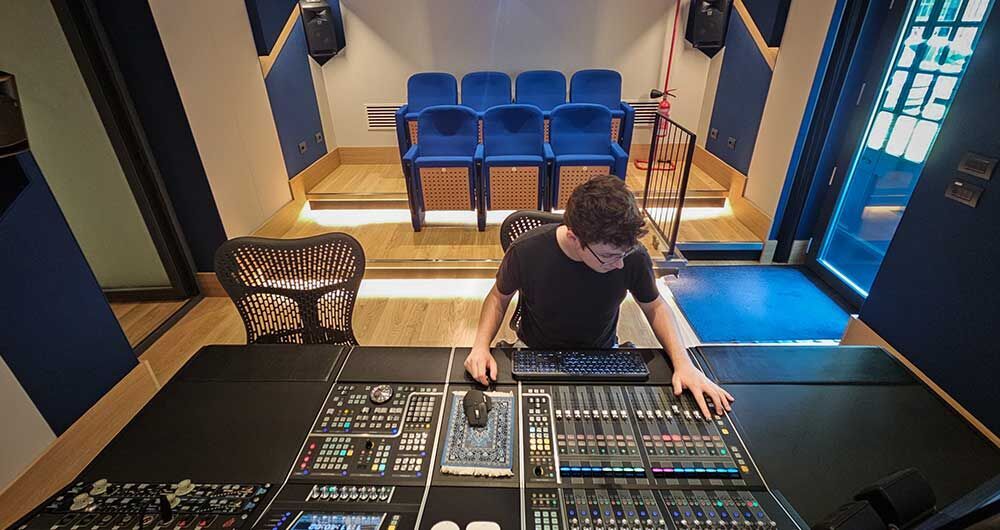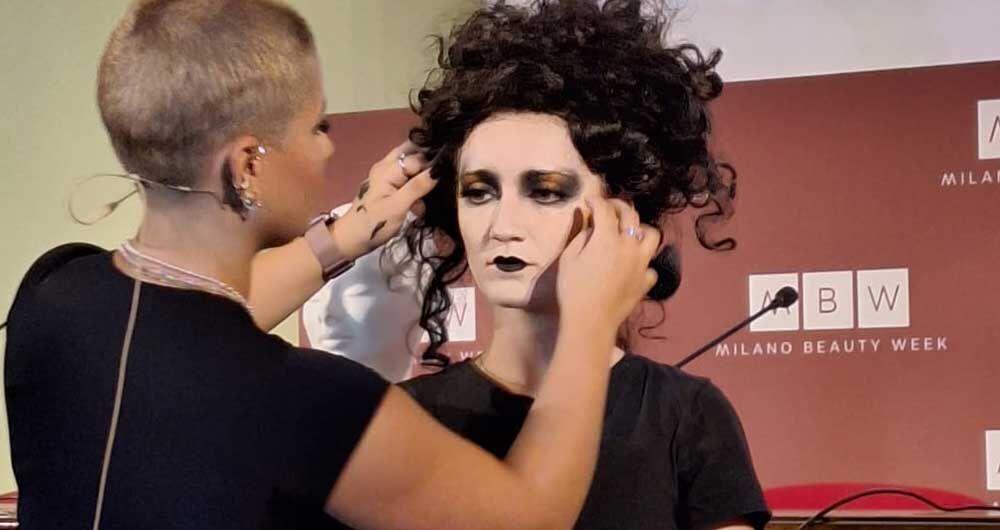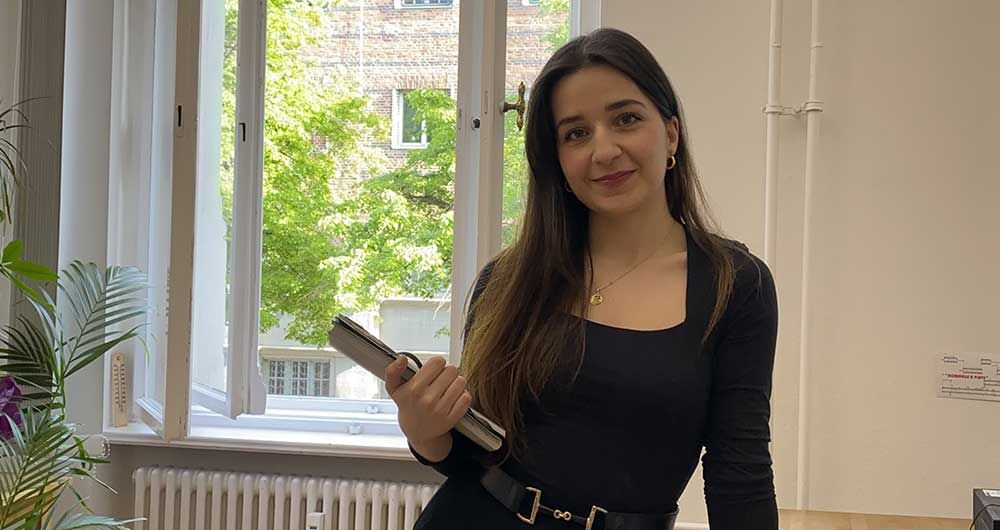Course in sound technology
Summer is just around the corner, but June is one of the busiest months for the Academy: it culminates with the long-awaited Institutional Concert, which regularly engages not only the artistic ensembles but also the Sound Technology Course.
To get into the mood, we met with Mirco Soldani, an alumnus, who tells his story for the Hall of Fame.
Mirco, what ties you to music and where did the idea of enrolling in the Academy come from?
Music has always accompanied my life, finally since I was a child. It was never just a matter of listening to it: what also struck me were all those invisible mechanisms that revolve around it. The magic that happens behind the scenes, the world of live performance, the work of the operators and technicians who turn an idea into a real experience. I was fascinated by the power of sound, not only as an artistic form of expression, but also as a narrative vehicle: music can convey deep emotions, evoke images, tell stories even without words. The same goes for sound in media, film, advertising-a universe that speaks through acoustic nuances, details, sound intentions that are often imperceptible but fundamental.
It was precisely from this fascination that the need arose in me to transform passion into a concrete, structured profession based not only on instinct and creativity, but also on solid technical and artistic skills. After earning a bachelor's degree in Music Informatics, a path that gave me a strong theoretical foundation on sound and its principles, I felt the need to affind to that background a practical, experiential training, closer to the working world.
That was how I chose to enroll in the Sound Technology Course, convinced that it could offer me just that bridge between theory and practice that I was looking for.
Where did you support the internship? Can you tell us about this experience?
I was lucky enough to do my training internship at Disc to Disc Productions, a production company specializing in advertising. From day one, I found myself immersed in an extremely professional, dynamic and stimulating environment, where each project was approached with great technical rigor and attention to detail. I was able to confront myself with real productions, experience tight rhythms and understand what it means to work with high quality standards. This experience was a turning point for me. It allowed me not only to put into practice the skills I had acquired during the academic course, but more importantly to understand what my direction was.
It was there that I clearly realized how passionate I was about the world of audio post-production: a field that, although it is very different from the music field from which I come, won me over because of its language, its precision, and the fundamental role that sound has in building the identity of a visual or narrative content. I can say that thanks to this internship I have found my way, and I have begun to consciously build my professional future in the world of audio for media.
And after the academy?
After graduation I chose to continue my path right where I had done my internship, continuing my internship at Disc To Disc Productions. Initially I affinished with the more experienced sound engineers, observing their working methods up close, learning how to read the needs of each project and how to manage the different stages of post-production with precision and attention to detail. This period of afficientation was crucial in consolidating my technical skills and developing operational confidence.
In time, I was given the opportunity to work independently on major productions. One of the most significant experiences was the complete management of the dubbing for the Formula 1 2025 video game ufficial: from the creation of the recording sessions, to the recordings, to the editing work and the final delivery of the material. It was a challenging and stimulating assignment that allowed me to put everything I had learned into play, while also dealing with the typical sfide of a production of that level.
In addition to this, I recorded, mixed and did sound design of commercials aired on both television and radio, coming into direct contact with the fast pace and attention to detail that characterize the world of advertising. In parallel, I continued to deepen and cultivate my passion for technology applied to audio, specializing in particular in speech synthesis based on AI. It is only the beginning, but I believe it can be a decisive turning point for the future of the industry. For me, it is also a real opportunity to unite my two souls-the technical and the creative-and build a professional profile as a sound engineer/programmer, capable of moving with agility between sound, code and innovation.
What do you think is the most complex part of this job?
Knowing how to read between the lines, anticipating the client's needs, finding efficient solutions even under pressure-all this goes far beyond simple technical mastery. It requires emotional intelligence, listening skills, sensitivity, and a good deal of experience in the field. In audio post-production, one of the most delicate, but also most crucial, aspects is communication. Knowing how to work as a team, establishing a constructive dialogue with creatives and professionals, is essential to achieve a result that really works, not only on a technical level, but also on an expressive and emotional level.
During recording sessions, for example, the sound engineer also has a human role: he or she must be able to create a serene atmosphere, put the people behind the microphone at ease, and convey calmness even when times are tight or pressure is high. Often it is not just a matter of “recording well,” but of knowing how to manage the people and dynamics of a studio, while always maintaining high quality and focus on the final product.
These aspects, sometimes less visible from the outside, are actually the heart of the business, and they make the difference between a job that is simply correct and a job that is truly successful.
What musical weight does a sound engineer have within a project? Do you believe that a sound engineer's choices can influence the success of a discografic product in a decisive way?
In the discografic world, the sound engineer can have a huge impact on the final result: the way the sound is treated can either enhance or completely penalize a song, just as it can be in the realm of audio post-production for media, where the role of the sound engineer is just as central, though less obvious. In a commercial, often only a few seconds long, the sound must be perfectly calibrated: the voice must come through clearly, the music must support the message without covering it, and the effects must be precise and consistent with the tone of the communication.
The sound engineer's job is to give shape and impact to the sound message, and even small details make a big difference. In short, even if we are not talking about music in the strictest sense, the choices of the sound engineer in advertising can determine how efficient, exciting, or simply...convincing a commercial is.
Would you like to leave a piece of advice for all aspiring students and pupils of the Sound Technology Course?
My advice is not to be too hard on yourself. Take the time to study, to listen, to get to know yourself and what you really like. Music is definitely a fascinating part of the sound world, but sound is so much more: it is cinema, advertising, video games, installations, emerging technologies... There are so many realities and possibilities that are often overlooked, perhaps only because you don't know about them.
That's why I say: stay curious, experiment, get your hands on everything you can. That is how you really discover what you are passionate about, and that is where you build your path. There is no one way, and there is no right way: there is your way. So my invitation is: experiment with everything, be guided by curiosity and seek out what you are really passionate about. That is where you will find your space.





